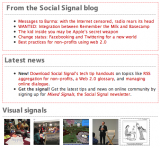Kelly Goto has a post suggesting the iPhone may be the breakthrough product in a category where promise has been tantalizing but success has been elusive: the ultra-mobile personal computer.
The success of the gesture-based touch screen interface is almost so fluid and easy to use it goes unnoticed. Even a 1-year old baby can use it. Since its release, many individuals formerly tethered to their laptops have admitted being able to switch to the iPhone for email and browsing when traveling. In many ways, the iPhone is the first ‘ultra mobile’ consumer device to give us a taste of tomorrow we can use today.
Go check out that video she links to. It's exactly as billed: a baby (okay... at 20 months, maybe a toddler) successfully navigating an iPhone app. It ain't exactly pivot tables in Excel, but this is still amazing to watch.
I left a comment on Kelly's blog. Here's the gist of it:
I don’t think that attractiveness of Mac technology to kids is an accident. The iPhone in particular has a vividness to it that’s only the latest in a line of recent design advances from the folks at Apple (remember OS X’s “lickable” interface?). From the little animation touches to the gorgeous, saturated, high-contrast graphics, Apple’s appealing not just to our inner efficiency expert, but also our inner child.
Maybe that’s part of the appeal of iPods, OS X and even the original Mac. Apple’s design aesthetic doesn’t just say “let’s work”, “let’s connect” or “let’s create” - it also says “let’s play.” That may be part of the reason some folks still find it hard to take Macs seriously in the workplace… but it’s also a big part of what makes using them so compelling...
Most projects don't have nearly the number of dollars available that Apple can throw at user experience, of course. But it's worth looking at your site, software, product or service, and asking if a little injection of playfulness wouldn't make a big difference.
By the way, we're going to see the latest iteration of Apple's come-out-and-play approach to interface design later this month when OS X 10.5, Leopard, is unleashed. We'll try to contain our sense of panting anticipation in our blog posts between now and then... but no promises.




![Dialog box reading 'Confirm: Do you want [deleted] to remember the username?' Dialog box reading 'Confirm: Do you want [deleted] to remember the username?'](/system/files/cancel-is-not-no.png)
